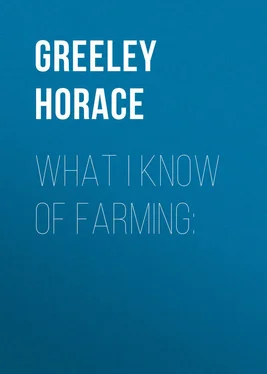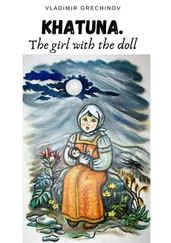Horace Greeley - What I know of farming:
Здесь есть возможность читать онлайн «Horace Greeley - What I know of farming:» — ознакомительный отрывок электронной книги совершенно бесплатно, а после прочтения отрывка купить полную версию. В некоторых случаях можно слушать аудио, скачать через торрент в формате fb2 и присутствует краткое содержание. Жанр: foreign_antique, foreign_prose, foreign_language, на английском языке. Описание произведения, (предисловие) а так же отзывы посетителей доступны на портале библиотеки ЛибКат.
- Название:What I know of farming:
- Автор:
- Жанр:
- Год:неизвестен
- ISBN:нет данных
- Рейтинг книги:4 / 5. Голосов: 1
-
Избранное:Добавить в избранное
- Отзывы:
-
Ваша оценка:
- 80
- 1
- 2
- 3
- 4
- 5
What I know of farming:: краткое содержание, описание и аннотация
Предлагаем к чтению аннотацию, описание, краткое содержание или предисловие (зависит от того, что написал сам автор книги «What I know of farming:»). Если вы не нашли необходимую информацию о книге — напишите в комментариях, мы постараемся отыскать её.
What I know of farming: — читать онлайн ознакомительный отрывок
Ниже представлен текст книги, разбитый по страницам. Система сохранения места последней прочитанной страницы, позволяет с удобством читать онлайн бесплатно книгу «What I know of farming:», без необходимости каждый раз заново искать на чём Вы остановились. Поставьте закладку, и сможете в любой момент перейти на страницу, на которой закончили чтение.
Интервал:
Закладка:
This, then, I take to be the gist of the popular criticism on our farmers as having unduly enlarged their borders: They have more land than they have capital to stock and till to the best advantage. He who has but fifty acre has too much if he lets part of his land lie idle and unproductive for lack of team or hands to till it efficiently; while he who has a thousand acres has none too much if he has the means and talents wherewith to make the best of it all.
I have said that I consider the soil of New England as cheap, all things considered, for him who is able to buy and work it, as that of Minnesota or Arkansas – that I urge migration to the West only upon those who cannot pay for farms in the old States. I doubt whether the farmers of any other section have, in the average, done better, throughout the last ten years, than the butter-makers of Vermont, the cheese-dairymen of this State. And yet there is, in the ridgy, rocky, patchy character of most of our Eastern farms, an insuperable barrier to the most economic, effective cultivation. If the ridges were further apart – if each rocky or gravelly knoll were not in close proximity to a strip of bog or morass – it would be different. But the genius of our age points unmistakably to cultivation by steam or some other mechanical application of power; and this requires spacious fields, with few or no obstacles to the equable progress of the plow. I apprehend that, for this reason, the growth of bread-corn eastward of the Hudson can never more be considerably extended, so long as the boundless, fertile prairies can so easily pour their exhaustless supplies upon us. Fruits, Vegetables, Roots and Grass, we must continue to grow, probably in ever-increasing abundance; but we of the East will buy our bread-corn largely if not mainly from the West.
He, therefore, who bays land in the Eastern States should regard primarily its capacity to produce those crops in which the East can never be supplanted – Grass, Fruits, Vegetables, Timber. If a farm will also produce good Corn or Wheat, that is a recommendation; but let him place a higher value on those capacities which will be more generally required and drawn upon.
In the West, the case is different; for, though Wheat-culture still recedes before the footsteps of advancing population, and Minnesota may soon cease to grow for others, as Western New-York, Ohio, Indiana, and Northern Illinois, have already done, yet Indian Corn, being the basis of both Beef and Pork, will long hold its own in the Valley of the Ohio and in that of the Upper Mississippi. As it recedes slowly Westward, Clover and Timothy, Butter and Cheese, will press closely on its footsteps.
Good neighbors, good roads, good schools, good mechanics at hand, and a good church within reach, will always be valued and sought: few farmers are likely to disregard them. Let whoever buys a farm whereon to live, resolve to buy once for all, and let him not forget that health is not only wealth but happiness – that an eligible location and a beautiful prospect are elements of enjoyment not only for ourselves but our friends; let him not fancy that all the land will soon be gobbled up and held at exorbitant prices, but believe that money will almost always command money's worth of whatever may be needed, so that he need not embarrass himself to-day through fear that he may not be able to find sellers to-morrow, and he can hardly fail to buy judiciously, and thus escape that worst species of home-sickness – sickness of home.
VI.
LAYING OFF A FARM – PASTURING
Whoever finds himself the newly installed owner and occupant of a farm, should, before doing much beyond growing a crop in the ordinary way, study well its character, determine its capacities, make himself well acquainted with its peculiarities of soil and surface, with intent to make the most of it in his future operations. I would devote at least a year to this thoughtful observation and study.
To one reared amid the rugged scenery of New-England; or on either slope of the Allegheny ridge, all prairie farms look alike, just as a European supposes this to be the case with all negroes. A better acquaintance will show the average prairie quarter-section by no means an unbroken meadow, "level as a house-floor," but diversified by water-courses, "sloughs," and gentle acclivities – sometimes by considerable ravines and "barrens" or elevated "swales," thinly covered with timber, or brush, or both. But I will contemplate more especially a Northern farm, made up of hill and vale or glade, rocky ridge and skirting bog or other low land, with a wood-lot on the rear or not far distant, and clumps or belts of timber irregularly lining brook and ravine, or lurking in the angles and sinuosities of walls and wooden fences, and a ragged, mossy orchard sheltered in some quiet nook, or sprawling over some gravelly hill-side. A brook, nearly dry in August, gurgles down the hill-side or winds through the swamp; while fields, moderately sloping here and nearly level there, interposed as they can be, have severally been devoted, for a generation or more, alternately to Grain and Grass – the latter largely preponderating. We will suppose this farm to measure from 50 to 150 acres.
Now, the young man who has bought or inherited this farm may be wholly and consciously unable to enter upon any expensive system of improvement for the next ten years – may fully realize that four or five days of each week must meantime be given to the growing or earning of present bread – yet he should none the less study well the capacities and adaptations of each acre, and mature a comprehensive plan for the ultimate bringing of each field into the best and most useful condition whereof it is susceptible, before he cuts a living tree or digs a solitary drain. He is morally certain of doing something – perhaps many things – that he will sadly wish undone, if he fails to study peculiarities and mature a plan before he begins to improve or to fit his several fields for profitable cultivation.
And the first selection to be made is that of a pasture, since I am compelled to use an old, familiar name for what should be essentially a new thing. This pasture should be as near the center of the farm as may be, and convenient to the barns and barn-yard that are to be. It should have some shade, but no very young trees; should be dry and rolling, with an abundance of the purest living water. The smaller this pasture-lot may be, the better I shall like it, provided you fence it very stoutly, connect it with the barn-yard by a lane if they are not in close proximity, and firmly resolve that, outside of this lot, this lane, this yard and the adjacent stable, your cattle shall never be seen, unless on the road to market. Very possibly, the day may come wherein you will decide to dispense with pasturing altogether; but that is, for the present, improbable. One pasture you will have; if you live in the broad West, and purpose to graze extensively, it will doubtless be a large one; but permitting your stock to ramble in Spring and Fall all over your own fields – (and perhaps your neighbors' also) – in quest of their needful food, biting off the tops of the finer young trees, trampling down or breaking off some that are older, rubbing the bark off of your growing fruit-trees, and doing damage that years will be required to repair, I most vehemently protest against.
The one great error that misleads and corrupts mankind is the presumption that something may be had for nothing . The average farmer imagines that whatever of flesh or of milk may accrue to him from the food his cattle obtain by browsing over his fields or through his woods, is so much clear gain – that they do the needful work, while he pockets the net proceeds. But the universe was framed on a plan which requires so much for so much; and this law will not submit to defiance or evasion. Under the unnatural, exceptional conditions which environ the lone squatter on a vast prairie, something may be made by turning cattle loose and letting them shift for themselves; but this is at best transitory, and at war with the exigencies of civilization. Whoever lives within sight of a school-house, or within hearing of a church-bell, is under the dominion of a law alike inexorable and beneficent – the law that requires each to pay for all he gets, and reap only where he has sown.
Читать дальшеИнтервал:
Закладка:
Похожие книги на «What I know of farming:»
Представляем Вашему вниманию похожие книги на «What I know of farming:» списком для выбора. Мы отобрали схожую по названию и смыслу литературу в надежде предоставить читателям больше вариантов отыскать новые, интересные, ещё непрочитанные произведения.
Обсуждение, отзывы о книге «What I know of farming:» и просто собственные мнения читателей. Оставьте ваши комментарии, напишите, что Вы думаете о произведении, его смысле или главных героях. Укажите что конкретно понравилось, а что нет, и почему Вы так считаете.












